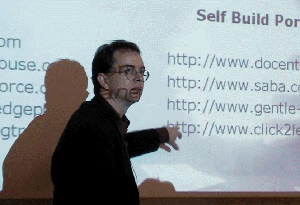News Story
Heronsgate showcased at Netties 2000, Oulu, Finland.
Thursday 23 Mar 2000
Thursday 23rd March KMi was showcased on the first day of the Netties 2000 conference in Oulu, Finland. Peter Scott presented a keynote presentation about the future of higher education entitled “Virtual Universities: On-line learning 2000”.
The conference was introduced by Olli-Pekka Heinonen, the Finnish Communications Minister, via a videoconference with Helsinki. The Minister stressed the interesting point that education is pretty much ready for the technology BUT the technology is not yet ready for education – and that is the next piece that we have to work on. The minister was folllowed by Matti Sinko, who talked about Best Practices in the Information Society, looking at Finand as an example of best practice. Matti is technology advisor to the ministry of education in Finland. He presented the Moon and Kommers (chaps from Twente) 3E model for evaluting innovation. Then he moved to the practicalities of the emerging ICT infrastructure in Finnish homes – overall a very big impact with over 40% penetration of computers into the home overall in the last few years. About 80% of Finnish students have a computer at home (although only half of these are networked).
In the KMi keynote, Peter examined the recent growth away from the campus towards Mega, Micro and Macro universities. He then examined the new corporate universities as a compelling trend towards the virtualization of higher and further education. He presented a model of student empowerment which focused on the work of Peter Whalley in Hersonsgate school to illustrate each of the key features of the model – challenging the Netties educators to have as much impact with their adults as Peter W. had with 9 year olds. Finally he showed how three KMi systems: Planet, D3E and stadium can help to move in this direction.
Jarmo Reponen from the Finnish Society of Telemedicine then introduced us to tele-care in Finland (pretty essential in the Oulu area because this centre covers the whole of the geographic northern half of the country with a distributed population of just over one million). The use of the multimedia electronic patient record was very neat – browser based access to all record features -eg direct access to the xray scans etc!) Extensive use of videoconferencing obviously – for remote sites to connect to central expertise for both primary and consultant care. Found that 74% of vc patients were willing to have next consultation by vc. The evaluation results were also strong for staff, evaluated as pretty useful, even in telepsychiatry, with 90% of staff (in both remote clinic and centre) wanting to have the next assessment via vc. Cost (admittedly tricky) was initially more expensive (ave 700fim per case) initial cost 1300 fim pc but break even point at 200 consultations … price halves at 500 consultations. Currently working on teleradiology (http://www.stakes.fi/finohta/e/reports/).
He next presented some nice wireless work – eg. sending xray pictures to consultant via their phones (the nokia communicator, naturally!) Most interestingly, one could see at a glance how many medics were in the audience as they all had the nice new nokia com phone sitting on the desk infront of them … but then, so did pretty much everyone else!
The next parallel session was dedicated to medical work. Pirkko Kouri (from Kuopio) started with the beginning life project which discussed a networked maternity clinic (www.kotineuvola.net). Expectant Parents are given password access to a bulletin board where they can discuss issues, direct access to posting queries to a consultant, and access to a variety of q&a material including videos explaining what will happen and why. (Interesting perspective on the concern over what to withold, for fear of worrying them!!!) Early days for evaluation – the first babies will be born in May, but the expectant families feedback is so far very positive.
Marja Rekila and Laura Suorsa talked over the GATE project which aimed at supporting Rehab services in northern Finland. Using videoconferencing to connect up centers with distributed multi-disciplinary teams in physio and speech therapy, for example, with patients.
Ulrike Arnold (from Humbolt in Berlin) introduced some medical language training software which aims to help medical student to understand technical medical terminology. Used the Telsi presentation environment which gives access to materials. Students are first tested to establish a basic competence in medical terminology. Some nice motivational self study work around crosswords and word search puzzles which were testing the medical terms.
A Greek presentation by Yiannis Koumpouros from Athens looked at a distance learning application in a Medical Ultrasound network. Finally, Markku Riipinen introduced web based diabetes care software which his organisation Pro Wellness is producing, despite the substantial handicap of a fuse taking out all power to both the computers and ohp. Diabetes is interesting in this regard as treatment takes full account (unlike some conditions) of the patient as an active team member!
Tommorrow, Netties begins by showcasing the work of Nokia, on mobile telecoms …
Latest News
KMi at the Palace of Westminster: Exploring Blockchain for Society and Economy
OUAnalyse at the Digital Ethics Summit 2025: Advancing Responsible AI in Education

